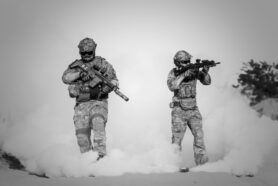Collaborative modern military interventions, whether launched through well-institutionalised alliances such as NATO or as ad-hoc coalitions, requires the participating states to agree an overall aim of the mission while also participating under their own national mandates. These mandates define the terms and conditions of participation, including the types of activities a state’s military may or may not engage, leading to a complex patchwork of overlapping but differing missions. Although there is typically one nation leading the coalition, each actor involved nominates a Red Card Holder (RCH), supported by a team of legal and intelligence experts, tasked with ensuring adherence to the national mandate.
The RCH is now very much part of the package of equipment and personnel committed to any collaborative military intervention. Along with the jets, pilots and technicians themselves, the RCH is an integral part of operations. The prominence of precision-guided munitions (PGMs) has made the role of the RCH even more critical. Now, as commanders have more options in their engagements than ever before, mandates go into granular detail in specifying what is and what is not acceptable. RCH team members, in their analysis of whether they are allowed to strike a target, whether they want to do so, and whether they can with the means available, rely on a vast body of international law in their assessments of distinction, proportionality and necessity. So while they may play a discrete and often-overlooked role in contemporary interventions, the importance of the RCH is not to be underestimated.
Source:



